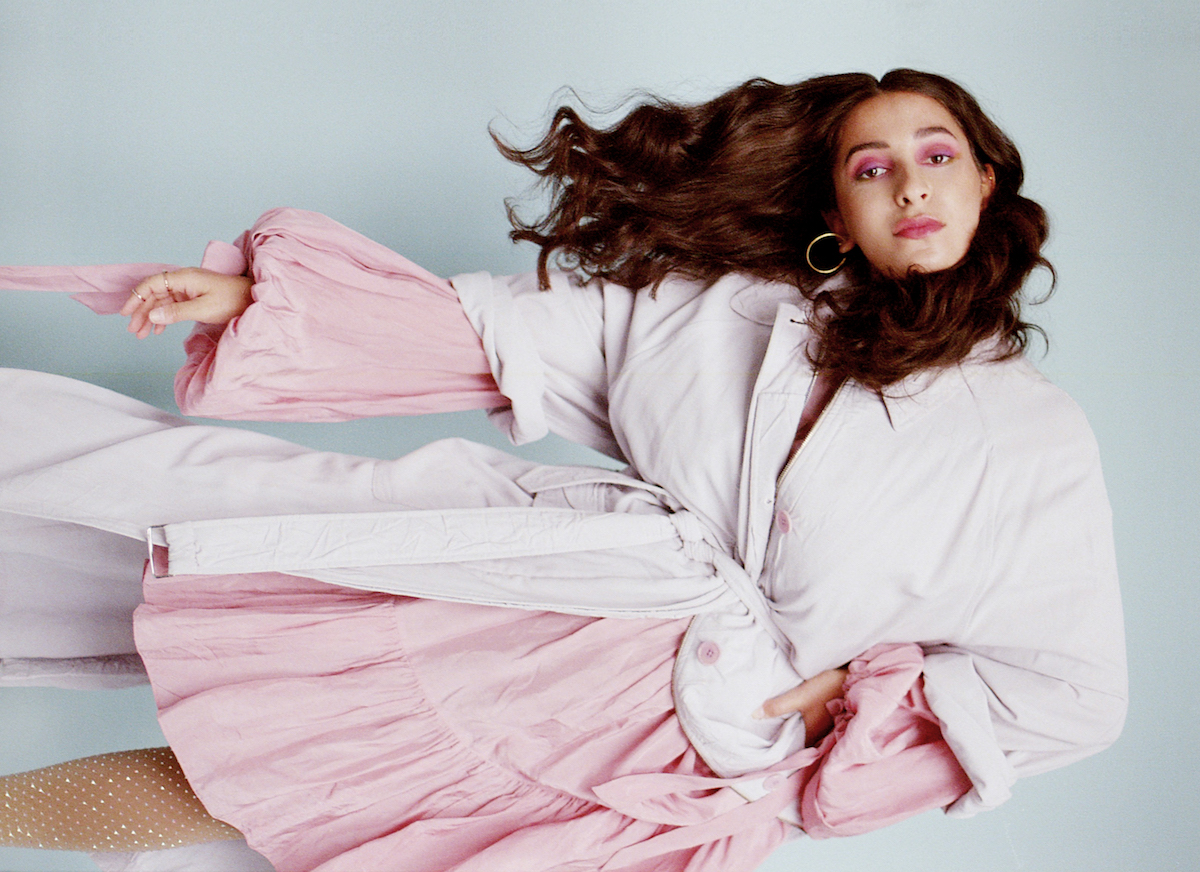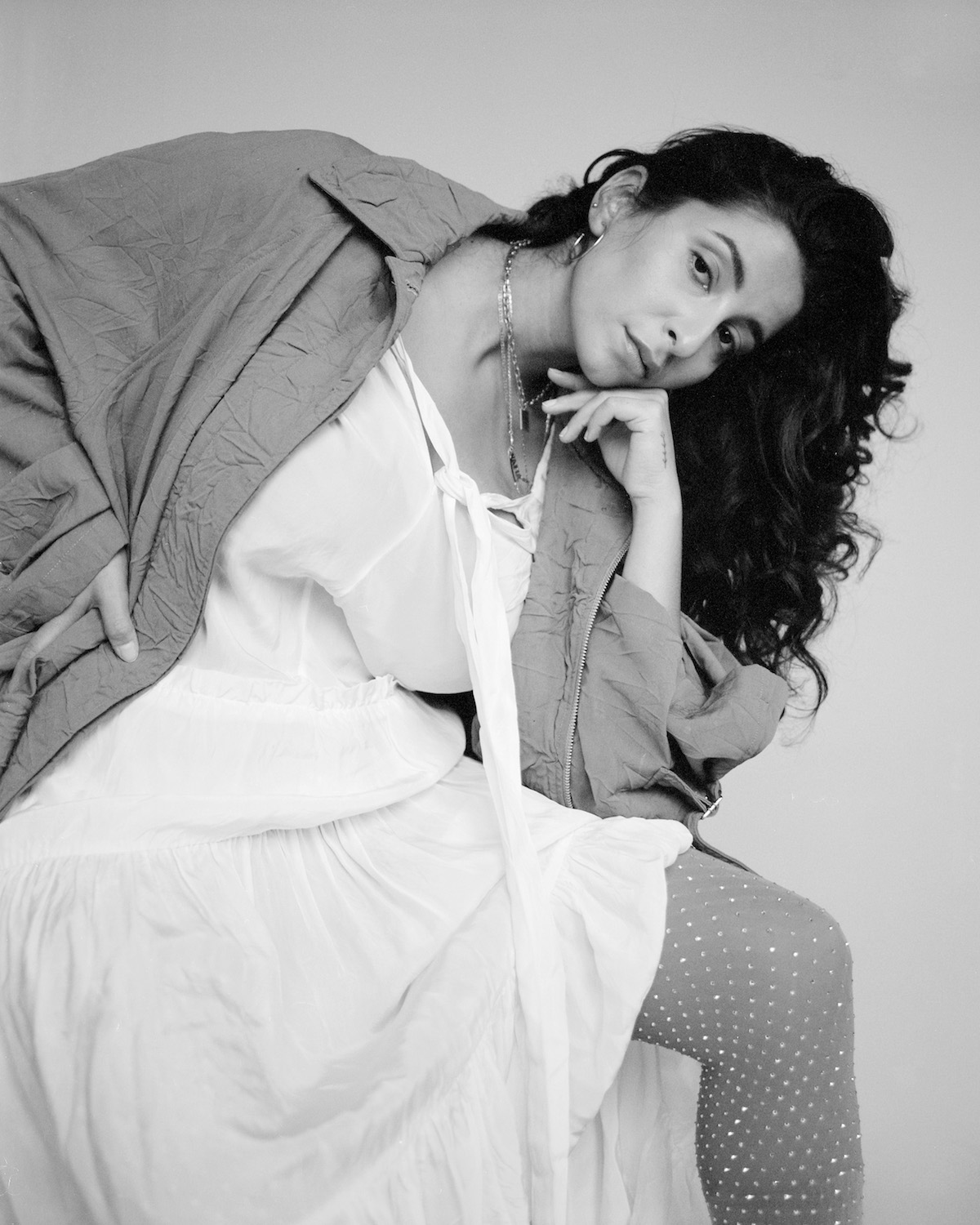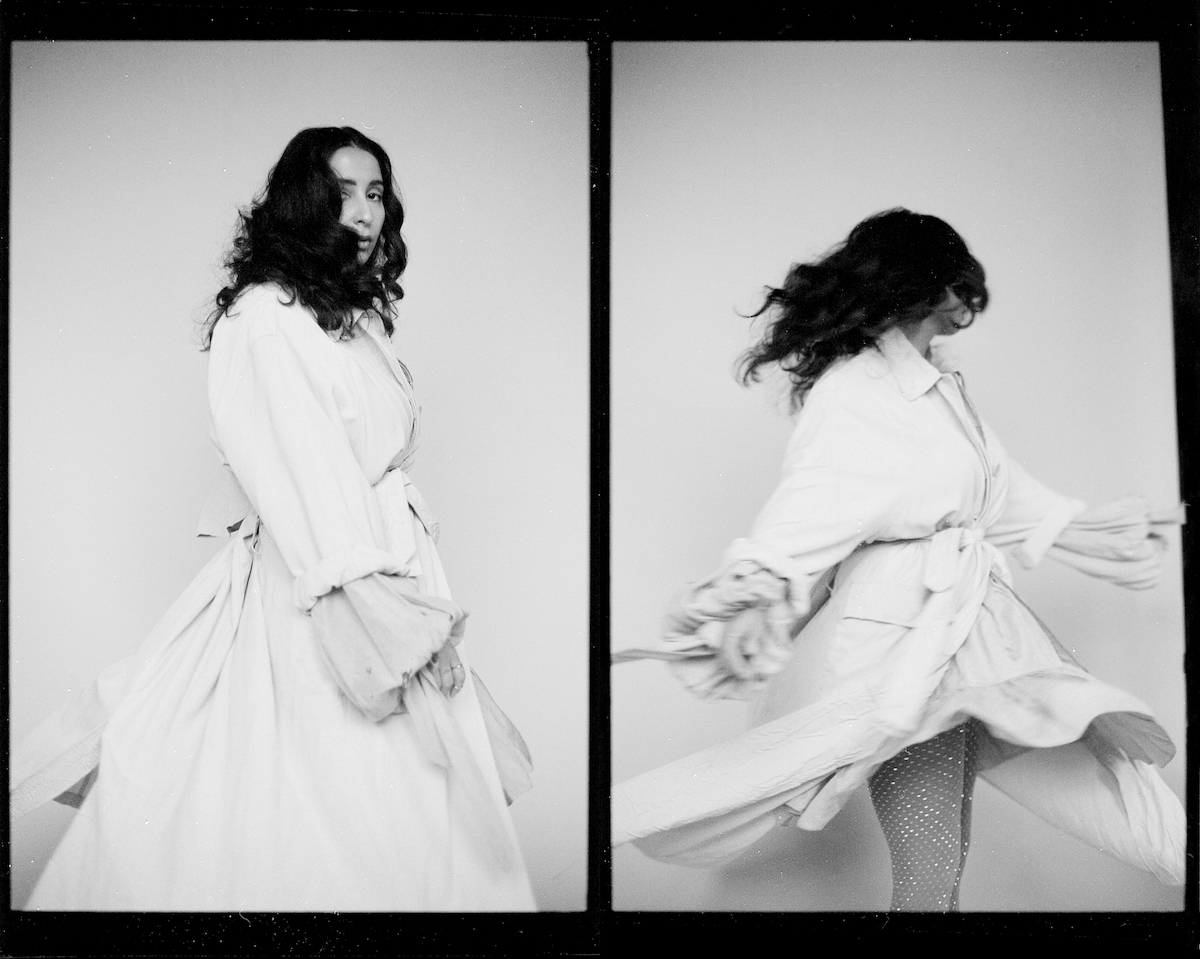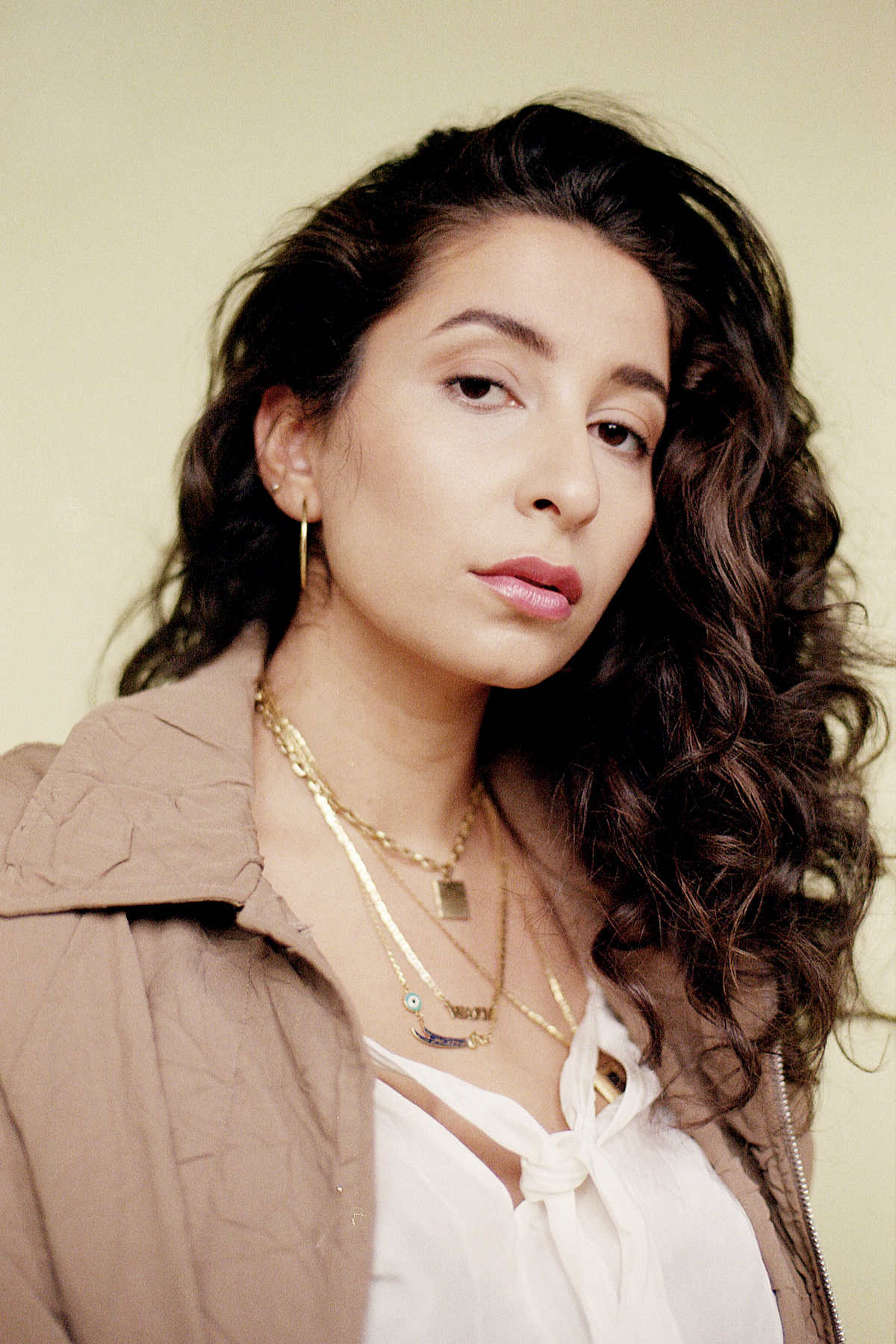I Got Nothing To Lose: An interview with Wafia
Music — 08.02.19
Interview by Emilia Slupecka
Photographer: Jingyu Lin
Stylist: Rasaan Wyzard
Hair: Arpita Brahmbhatt
Makeup: Ahbi Nishman

Dress and Coat 3.1 Phillip Lim, Stockings Gucci
Wafia Al-Rikabi is a talented R&B/electronica songstress who is proud of both her Muslim and Arabic heritage. The 25-year-old Australian singer-songwriter, known professionally as Wafia, was born to hard-working immigrant parents – an Iraqi Father and a Syrian mother.
Wafia is one of a few artists who find it essential to be more vocal about their heritage. However, Wafia is focused on making music that’s accessible to everyone—whether she’s talking about falling in love with a girl for the first time or the Syrian refugee crisis, a topic that hits close to home.
The music video for “Bodies” itself is equally thought-provoking. Every visual frame becomes more progressively arresting than the last. Wafia herself and director Alli Coates tackle race by presenting the cohesion of the human body in all forms as an upbeat pop song.
We caught up with Wafia after she got back from touring America and Europe, and talked about the emotions she attaches to her music, as well as dream collaborations and plans for the future.

Dress and Jacket 3.1 Phillip Lim, Stockings Gucci, Jewellery Wafia’s Own
Emilia Slupecka: What are your first memories of music?
Wafia: My dad used to have a lot of restaurants, and that used to be a thing, so around New Year’s most years, wherever we lived, whether it was Holland or in New Zealand, he would put on these parties at New Year’s and fly in artists from the Middle East to sing at these parties. He would do all the food and everything for it. It’d be this event held by one of his restaurants in this huge hall.
I think that’s one of my first memories of music, getting to meet all of these artists and feeling super special, being backstage with them. Even though they were Middle Eastern, I loved that music. It was a pretty cool thing to grow up with.
I heard you previously studied biochemistry at University. How did you get into making music?
I feel like science and pre-med was using a very particular part of my brain all the time, and honestly, it was just exhausting me. So I started picking up the guitar in an effort to occupy a different part of my brain. I fell in love with playing the guitar and singing and songwriting. Eventually, it became a more dominant aspect of my life, it just sort of crept over and yeah, I’ve been doing it ever since my second year of college.
Where do you find your inspiration most when you create?
I think in the people around me. In the stories that I live through them, or if I see that something’s really affecting them. Humanity is really inspiring to me, especially people and their stories.
When it comes to sitting down and writing a song, where do you tend to start?
I tend to start with a feeling. I think that’s the most important thing for me to capture in every song that I try to write. The best thing I can do is try to convey that feeling and go from there. Whether it is the chorus or the concept for what the song will be. That will then drive production and lyrics.
Do you think that your parents being from Syria and Iraq, living in the Netherlands and now Australia, has influenced you as a person and had a significant impact on your music?
Yeah, I think it’s kind of inevitable. The first music I ever listened to growing up was Middle Eastern Arabic music. I think it’s kind of ingrained in my blood, whether I love it or not. I still listen to that music a lot for inspiration. I always think that they release music that doesn’t sound like music created on this side of the world. It’s an amazing thing to tap into. I like to think of it as a source of inspiration if I need it.
Can you talk me through the process of writing and creating the song “Bodies”?
Yeah, so at the time, Trump wasn’t president yet, and my mum was also heavily involved in the process of helping with visas and trying to get people out of Syria. She had six or seven people she was helping. They all have their own families. They all have their own kids. So, she filled out an application for every single one of those people and their families. She was sending them out, even sometimes to the Dutch government and just sitting there, crossing her fingers, hoping to hear at least one letter back saying yes. She was on her last leg; this was the final application she could do before they would ultimately be denied for a very long time. The letter came, and it said that everyone was denied. And slowly they just kept trickling in, for each family, they got a denied letter. Another one and another one. Just seeing her go through that was very difficult.
I just couldn’t understand, because at the time there were all these images of people crossing the border and running away. When I would watch the news from my parents’ television, which had the Arabic channels, and see people leaving, it was always portrayed in a very sad way, that these people leaving was sad. Then when I would go to Europe or to America, or even watch Australian television, and it was more like ‘these people are coming, how do we stop them?’.
I thought it was so interesting to see how a large group of people can be portrayed so differently depending on the shots that you use. When there are that many people walking, there’s just one speck of hope leading all of these people. I saw my parents have that. They were just lucky enough to do it twenty-five years prior. Some so many people had that hope that led them. This is a huge migration of people, a displacement of people. It saddens me to see it be portrayed so negatively when I saw it as something so beautiful and hope-driven.
I wanted to simplify it down to its core. It’s just a bunch of bodies. In any other scenario where there’d be a music festival, or a peaceful protest or whatever it is, that would be portrayed by the media as something really pretty, or really amazing, because there’s something beautiful about people coming together. I guess that’s what I wanted to write a song about. Any large group of bodies is no different from another because they’re all focused on one thing. That’s what I tried to portray with that song.
Let’s talk about some of your new stuff. Your recently released single “I’m Good”, tell me about that project.
So, I actually wrote that song this year, and I wrote it with Roget Chahayed, John Hill, and a songwriter called Wrabel. I’ve been working a lot with Roget and Wrabel, but this was my second session with John. I think we were all just trying to get something to happen and I wanted a song with a really cool bassline. Roget is like an absolute master of production and he just plays this incredible bassline. That was when we kind of all knew. It was maybe the sixth idea we settled on that day, so when we all sort of felt ‘this is the one’.
I think, at the time, I just wanted to capture a positive feeling before I knew all the negativity would come and hopefully that would then carry on until after, on the other side of the breakup. So I guess I kinda wrote “I’m Good” for the other side of it all.
Just a few days ago you finished your tour promoting the single. How was it? What was your favourite place that you visited?
Oh, it was amazing. London was really special, obviously. I’d never played a headline show in Europe before or in London, so that was really cool. To see people that listened to my music come out, because most of them had just found the tour dates on Spotify. It was very special because they were active audience members who went out of their way to come here.
Sometimes when you’re the support, people are less engaged than you’re used to, especially when you’ve just come off the back of playing your own shows. By the end of my set, to see how people were engaging and when they recognised a song that maybe they’d heard and reacted to it was really special. I just get up there and sing for me, and when people see that I’m connected with the music, naturally they will connect with it too.
The biggest venue we played was Seattle, and that was nine-thousand people. It was crazy to see nine-thousand people screaming back your lyrics. It felt awesome to have created something so special to these guys and to see it in context around the country.

Dress and Coat 3.1 Phillip Lim, Stockings Gucci
What sort of emotions do you attach to your music?
All of the songs I write are about people, so the emotion is how I feel about that person. Even if it’s a positive song or whatever, and now I’m not close to that person any more, I still love that song for the feeling I tried to capture. But it goes hard, you know, to come back to a song about someone you’re not close with anymore.
You need a process, as well, for writing a song. If you’re finding the process of putting it together is unpleasant, or maybe they wrote it about someone that they don’t like anymore, I really struggle with that.
Who would be your dream collaboration?
I’d love to do something with SZA. I think she’s really, really cool. I think with Brian Eno, who makes electronic music which started in the 70s. I really love him. There’s this country artist called Kacey Musgraves; she writes incredible songs.
If you could work with any person, living or dead, who would it be and what would you do?
My parents’ favourite movie while I was growing up was The Bodyguard, so that soundtrack always played in my house. That’s definitely up there, but I don’t know what the hell I’d do with Whitney Houston…probably just stand in the background and give her moral support. I’d just do that; there’s nothing I could add to a Whitney Houston song!
How did the song “Heartburn” come to fruition?
I wrote that with my friend Ben Abraham. We pretty much wrote it all via voice memo from across the country. I’d never really written with anyone before at that point, and neither had he. We were both just getting our start and feeling each other out. We realised we actually write really well together. We were driving one day, and he told me “this anecdote of yours, this is kind of the narrative I had in my head”, and then I filled in the blanks with lyrics. There was a lot of back and forth, and it was incredible. I’d never written a song like that, and to this day I never have since, but it was really special. At that point, I’d never trusted anyone else with my feelings to write a song with, so we ended up having this great bond but no one to produce it.
I remember the day I met Ben, I also met this producer called Ta-ku. He had reached out to me to do a cover of “American Girl” and this other song that he did for a friend called Charles Murdoch. I sent it to him one day and said “Hey, do you think you could produce on this song? It’s the last song I want to add to my EP. Let me know; we go to mixing next week if you could do something that would be great, thanks”. He was super down, and he loved the song. Then we didn’t hear from him all week, and I was super panicked. My engineer was like “you’re gonna be fine, it’s gonna come through, I believe it” and he did, Ta-ku came through. He added a bunch more synths to round it all out, and that was the song.
We had about two or three songs out at the time, and Ta-ku gave me this big break. He flew me to the United States, and he played MoMA PS1 in New York and Neue House in LA. Without him, I never probably would’ve had that opening to come to the states. We eventually toured Europe and the US again together.

Dress and Coat 3.1 Phillip Lim, Jewellery Wafia’s Own
What song are you playing on repeat right now?
I really like the new Ariana Grande song “Imagine”. I’ve been singing that a lot. I’m fascinated by the melodies that she’s used in it. I think my favourite album of this year was Kacey Musgraves album. I’ve been listening to that on repeat too. She has this song called “Space Cowboy” which just… yeah… I feel that! That’s one of my favourite songs of this year.
What’s happening for you next?
I’m hoping to release a lot of new music next year. I’m playing some shows in the US. I’m definitely doing a festival.
I think you’re doing SXSW?
That’s right, yeah. I’ve never done that either.
Are you excited?
Yeah, really excited. Hopefully, we’ll add some more things in-between, but I’m really excited to be playing those shows, I’m very into that whole thing. I think it’s a rite of passage for a lot of musicians.